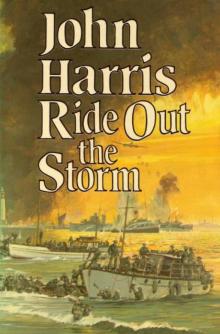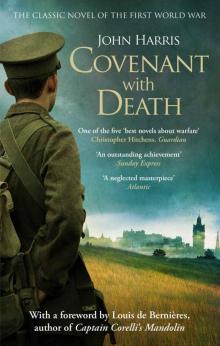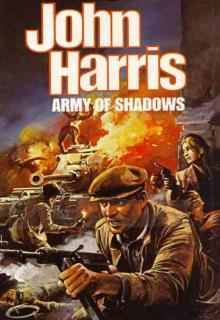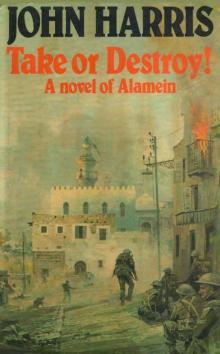- Home
- John Harris
So Far From God
So Far From God Read online
Copyright & Information
So Far From God
First published in 1989
Copyright © Juliet Harris; House of Stratus 1989-2011
All rights reserved. No part of this publication may be reproduced, stored in a retrieval system, or transmitted, in any form, or by any means (electronic, mechanical, photocopying, recording, or otherwise), without the prior permission of the publisher. Any person who does any unauthorised act in relation to this publication may be liable to criminal prosecution and civil claims for damages.
The right of John Harris to be identified as the author of this work has been asserted.
This edition published in 2011 by House of Stratus, an imprint of
Stratus Books Ltd., Lisandra House, Fore Street, Looe,
Cornwall, PL13 1AD, UK.
Typeset by House of Stratus.
A catalogue record for this book is available from the British Library and the Library of Congress.
EAN ISBN Edition
075510238X 9780755102389 Print
0755127587 9780755127580 Mobi/Kindle
0755127862 9780755127863 Epub
This is a fictional work and all characters are drawn from the author’s imagination.
Any resemblance or similarities to persons either living or dead are entirely coincidental.
www.houseofstratus.com
About the Author
John Harris, wrote under his own name and also the pen names of Mark Hebden and Max Hennessy.
He was born in 1916 and educated at Rotherham Grammar School before becoming a journalist on the staff of the local paper. A short period freelancing preceded World War II, during which he served as a corporal attached to the South African Air Force. Moving to the Sheffield Telegraph after the war, he also became known as an accomplished writer and cartoonist. Other ‘part time’ careers followed.
He started writing novels in 1951 and in 1953 had considerable success when his best-selling The Sea Shall Not Have Them was filmed. He went on to write many more war and modern adventure novels under his own name, and also some authoritative non-fiction, such as Dunkirk. Using the name Max Hennessy, he wrote some very accomplished historical fiction and as Mark Hebden, the ‘Chief Inspector’ Pel novels which feature a quirky Burgundian policeman.
Harris was a sailor, an airman, a journalist, a travel courier, a cartoonist and a history teacher, who also managed to squeeze in over eighty books. A master of war and crime fiction, his enduring novels are versatile and entertaining.
A Thought
‘Poor Mexico, so far from God
and so near to the United States.’
Porfirio Díaz
Ruler of Mexico from 1876 to 1911
Author’s Note
To Britain in 1914, the United States of America were of the utmost importance as a supplier of arms. To Germany Mexico was of crucial importance because, properly manipulated, she could be the means of drying up that supply. But Mexico was in a state of upheaval. There had been a revolution in 1911 by the peasants against the hacienda-owning classes who had treated them with total indifference, even cruelty. Foreign businesses remained powerful – ‘Mexico, mother of foreigners; stepmother of Mexicans’ was the saying – and the land stolen by the hacendados had never been returned. Enraged leaders swore never to rest until it was, until the last vestiges of Spanish and foreign business influence had been eradicated. So, with the shadow of their fury across the whole country, Mexico descended into the anarchy of small private armies whose generals were all determined to gain control, while nations like the United States and as distant as Britain and Germany became involved.
Though the main characters in this book are fictitious the events are not, and were all part of the preparations for and the conduct of the war which broke out in Europe. I am indebted for details to the Villa Museum in Chihuahua City, Mexico; the library at El Paso, Texas; to Franz von Rintelen’s memoirs; to the books of the survivors of the period; and especially to Barbara Tuchman’s The Zimmermann Telegram (London, 1959).
Map - LH
Map - RH
Map
Part One
One
The corpse was that of a soldier. It wore faded scraps of uniform and hung limply with a rope round its neck from the arm of a telegraph pole that was tilted to one side under its weight. Thin brown feet, bare of shoes, pointed downwards, the whole ugly shape moving slightly in the breeze.
The train had halted outside the town and the carriage had come to a stop directly opposite the swinging corpse so that it was impossible to avoid looking at it. The chatter inside died and the card games stopped abruptly. Turning in their seats, the women passengers resolutely faced the other way, trying not very successfully to keep their children from staring through the window at the horror that hung at eye level, impossible to avoid.
The train consisted of a rusty-looking engine with a large cowcatcher and a funnel like a jug, attached to a long line of battered coaches, their wooden sides splintered by bullets, their windows in some cases missing entirely. There were no first-class carriages, only the hard-seated compartments used by the peasants and, with the whole country on the move, everyone was packed in together.
Lighting a cigarette, Pierce Fitzpatrick Slattery studied the people around him. They were a colourful lot in a mixture of native charro costume, peasants’ cotton and city clothes, with personal touches of gaiety here and there in the form of rebozos or bright sarapes. Until the sudden silence imposed on them by the hanged man, even an occasional burst of song had come from them as they had travelled south. There were two youths clutching sacks in which something moved, an old man with a fiddle who had been playing ‘La Paloma’, a leather bottle of tequila going the rounds, and two men dancing with each other, carefully avoiding a blind youth who was reciting a long heroic poem about Pancho Villa, the rebel Mexican leader who was terrorising the northern border of the country.
Now they were silent, and the heat inside the carriage increased as the sun climbed higher. The surrounding land was bare, and tawny as a lion, the distant low range of mountains like the knuckles of its spine. Slattery had read a lot about Mexico and had expected colour, flowers and music but never this emptiness, or the constant wind that rolled the dust in red clouds across the endless landscape. Opposite him a woman sat silently, trying to avoid looking at the corpse with its popping eyes and protruding tongue. She wore a cloche hat and veil and a lightweight coat and dress of dark blue that enhanced the blueness of her eyes which, in a country of black fathomless orbs, seemed to shine against the raven darkness of her hair. She sat ramrod-straight in her seat, slim, pale, her features finely boned, no longer a girl but beautiful still.
This woman, Slattery told himself, starts where all the rest leave off.
Near her an American wearing a brown derby hat and a brown suit moved restlessly up and down the centre aisle, smoking a cigar. He gestured at the corpse.
‘The whole goddam country’s full of those things,’ he said. ‘Guy here says that one’s Balthasar Vásquez. He was one of General Villa’s boys who was picked up by government troops.’ He nodded to Slattery. ‘Lidgett’s the name,’ he said. ‘Aloysius Lidgett. You here for the same reason I’m here?’
‘What reason would that be?’
‘To join Villa,’ Lidgett said. ‘He crossed the border to start the war again.’
As Slattery well knew.
Mexico was in turmoil. Two years before, in 1911, a rebellion, raised by Francisco Indalecio Madero and supported by people as diverse as landowners and outlaws, had toppled the aging dictator, Pofirio Díaz, from the presidency he had occupied for thirty years. Elected in his place by popular vote, Madero had become president and the revolution had seem
ed to be over.
But after thirty years of dictatorship and with no followers with experience, Madero had been forced to employ many of Díaz’s old supporters, so that he had been toppled in his turn by a rising backed by General Victoriano Huerta, the very man he had appointed to put it down. With Madero murdered, Huerta had become provisional president in his place and once again it had seemed the revolution was over
‘It isn’t, though,’ Lidgett said. ‘Up north they call it the pump handle revolution. Because it goes up and down. It’s just a comic opera affair.’
Slattery indicated the swinging corpse. ‘I bet he doesn’t think so.’
‘I guess not. Huerta reckons he’s nothing to fear, but a people in arms is more powerful than any army.’
‘That’s a nice phrase, Mr Lidgett.’
‘I’m a newspaperman. I deal in ’em. You like nice phrases?’
‘I’ve dealt in ’em, too, in my time.’
Lidgett smiled, a big handsome man with white teeth and features that matched Slattery’s own rangy good looks. ‘Call me Loyce,’ he said. ‘Everybody does. I decided I’d come down here and make my name. But I was with Teddy Roosevelt in Cuba in 1899 and I decided it might be more fun to be in the fighting than writin’ about it.’
He gestured. ‘Madero was often wrong, I guess,’ he went on. ‘But when they murdered him, armies started to appear from nowhere. Even guys who’d profited under Díaz. They’re siding with peóns who’ve become generals leading their own goddam ragamuffin troops.’
So Slattery had heard. At the top was Venustiano Carranza, a Sonora landowner; below were all creeds, colours and conditions down to the ex-bandits, Emiliano Zapata in Morelos, south of Mexico City and a constant threat to the capital, and Pancho Villa in the north, a peasant with a genius for war and a firm base in Chihuahua, whose sphere of activity was along the Texas-Mexican border.
‘Would any of them ever come round to supporting Huerta?’ he asked.
‘No.’ It was the woman who spoke this time. ‘Carranza will never acknowledge a regime that’s not properly elected.’
Her voice was low and rich and, though she spoke perfect English, there was a trace of something harsher in it. Now that she’d joined in the conversation Slattery was determined to keep her interest.
‘What about Zapata?’ he asked.
‘He couldn’t even agree with Madero,’ Lidgett said.
‘And Villa?’
‘He was the guy who really put Madero in power. Him and Pascual Orozco. Only Orozco decided he hadn’t got enough out of the revolution so he started another to get rid of Madero. Huerta and Villa worked to get rid of him. But Huerta couldn’t stand Villa and Villa had to bolt across the border. He’s back now, though. Because they killed Madero. He came with eight men, nine horses, a few rifles, and a war chest of thirty-five pesos and a silver watch.’ Lidgett grinned. ‘He’ll have more now.’
The train jerked and the corpse outside the window moved out of sight. As the train stopped again, they heard someone in the next coach scream as they caught sight of the man on the telegraph pole. Lidgett was busy looking out of the window and Slattery became aware of being studied by the woman opposite.
‘Are you on business?’ she asked. ‘An American?’
‘Neither. Are you American?’
The woman frowned. ‘I’m not sure what I am,’ she admitted. ‘My father was a German singer who married a Mexican. I was born in Germany and taken to the States as a child. We took out naturalisation papers in New York.’
‘Doesn’t that make you American?’
She shrugged. ‘Does it work that way? Is it that simple? My father died and my mother returned to Mexico. When she died I joined my brother who has property here. My name’s part German, part Mexican – Magdalena Graf. Though I am officially an American citizen, my instincts, I think, are still German – if they’re not Mexican. I’m a singer.’
It explained the richness of her voice. ‘Opera?’
‘Nothing so grand. Zarzuela.’
‘What’s that?’
‘How do I describe it? It’s a Spanish creation, a special kind of stage piece with melodies from Spanish roots. But it’s not operetta – though we do operetta. But operetta doesn’t allow for the Spanish flavour. Zarzuela is different. It’s passionate. It’s – it’s’ – she shrugged and gave a little laugh – ‘it’s zarzuela. I studied at the Conservatory.’
He listened to her, enchanted. Caught up by something that interested and excited her, her face came alive, her body and her hands moved, and her eyes lit up. ‘And you with a company?’ He assumed she belonged to some travelling troupe that went in for one-night stands in backwoods towns, with shabby sets and costumes inherited from other travelling companies.
‘Of course.’ She spoke proudly, almost condescendingly. ‘They’re on the train.’
It explained the people in city suits he’d noticed with the colourful personal additions of rebozos and bright sarapes, and the occasional bursts of song.
‘We’ve been in Ciudad Juárez on the border,’ she went on. ‘We appear next in Chihuahua. I have a house there. It’s handy for slipping into the United States. I’ve sung in El Paso and Houston. Even in Tucson. One day I’ll sing in New York.’
‘Are you famous?’
‘People know me. Why are you here?’
Slattery smiled. ‘That’s a good question,’ he said.
It was a very good question and one that Pierce Fitzpatrick Slattery hadn’t yet managed to answer. Junior army captains with only one sound leg could never really expect to pursue a very active military career. The fighting in the Balkans in 1912 had drawn him as an interested but very unofficial observer, but a Turkish shell at Uskub had finished the trip rather more abruptly than he had expected. After leaving hospital back in England he had been peremptorily summoned before his commanding officer.
‘You realise you’ve ruined your career,’ he was told.
‘I’ve also ruined my leg. It’s a good job I’m a cavalry officer and don’t have to walk.’
‘I don’t think you’re going to be a cavalry officer for much longer,’ the colonel snapped. ‘Not with this regiment!’
‘I didn’t think I would,’ Slattery had responded spiritedly. ‘That’s why I’m resigning. I don’t intend to be summoned to the War Office to be informed I’ve been a naughty boy.’
He had rightly assumed his career was over and his father, who had been in the Foreign Office, had suggested that he went to see a man he knew in Whitehall who might find something for him to do.
The office was on the top floor of a solid-looking block overlooking the Thames. It seemed remarkably bare. There were no files, no staff and no secretary. It contained two men, one with bushy military half-whiskers that looked as if they’d been dyed. He was a former officer from one of the British county regiments and was reputed to be the son of a regular army officer and a Polish countess. He spoke fluent German, Polish, Italian and French. His assistant was a white-haired ex-naval officer with a wooden leg which had replaced one he had lost in a train smash in Scotland. He was said to have cut off the shreds of the smashed limb with his penknife to release himself. Nobody knew who owned the office. In fact, George Bernard Shaw lived downstairs and he had no idea what was happening above him. Which, the men upstairs liked to say, seemed to indicate they were doing things right. They were busy with a discussion when Slattery arrived.
‘If we’re going to do the job,’ the naval man was saying, ‘then let’s do it properly and recruit professionals. No more amateurs like Baden Powell with his bloody paint box.’
‘He was good at sketches,’ the military man pointed out.
The naval man sniffed. ‘I always thought there was something a bit artificial about him. After all that fuss over Mafeking, when they gave him a column he hardly distinguished himself. Always seemed to be acting. Liked to disguise himself as a butterfly hunter, a journalist, a snipe shooter – things like that. Oug
ht to have belonged to a seaside concert party.’
His military opposite number shrugged. ‘He always prepared a detailed report at the end of every trip, all the same,’ he pointed out. ‘And presented it free, gratis and for nothing to the War Office.’
‘Who took no bloody notice whatsoever!’
Slattery listened to them, faintly amused. He had come to the conclusion that they’d forgotten him when the naval officer suddenly asked him what languages he spoke.
‘German and Serbo-Croat, which I picked up in the Balkans,’ he said. ‘French because my mother’s French. And Spanish because I was born in Gibraltar where my father was on the staff of the Governor. My mother didn’t like the place so we had a house in La Linea in Spain where I grew up.’
‘We want Spanish speakers,’ the naval man said. ‘And you’d be no good to the army if a war came, would you?’
‘Wouldn’t I?’ Slattery was already a little sensitive about people who liked to write him off because he had a limp.
The man behind the desk eyed him with interest. Slattery was a large man, tall and broad with blazing red hair topping a face that was commanding rather than handsome.
‘That broken leg you got in the Balkans wouldn’t be much good if war came,’ the man with the whiskers said.
Slattery wondered just how much they knew about him but he had to agree about his leg. It had been badly set by an Albanian doctor who wore what appeared to be a velvet smoking-cap and crap-catcher trousers, and looked, smelled and behaved like a vet, and it had had to be broken again on his return to England. He certainly wasn’t going to do much marching. He tried a different tack.
‘Is war coming?’ he asked.
‘Of course it is,’ Bushy Whiskers snapped.

 China Seas
China Seas The Mercenaries
The Mercenaries Road To The Coast
Road To The Coast The Thirty Days War
The Thirty Days War The Old Trade of Killing
The Old Trade of Killing Ride Out The Storm
Ride Out The Storm Corporal Cotton's Little War
Corporal Cotton's Little War Fox from His Lair
Fox from His Lair Paint The Rainbow
Paint The Rainbow Flawed Banner
Flawed Banner Covenant with Death
Covenant with Death So Far From God
So Far From God The Sea Shall Not Have Them
The Sea Shall Not Have Them The Cross of Lazzaro
The Cross of Lazzaro Smiling Willie and the Tiger
Smiling Willie and the Tiger Harkaway's Sixth Column
Harkaway's Sixth Column The Sleeping Mountain
The Sleeping Mountain The Claws of Mercy
The Claws of Mercy North Strike
North Strike Picture of Defeat
Picture of Defeat Army of Shadows
Army of Shadows Right of Reply
Right of Reply Getaway
Getaway The Lonely Voyage
The Lonely Voyage Take or Destroy!
Take or Destroy! The Backpacker
The Backpacker A Funny Place to Hold a War
A Funny Place to Hold a War Swordpoint (2011)
Swordpoint (2011) A Kind of Courage
A Kind of Courage